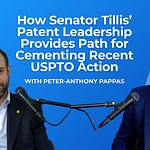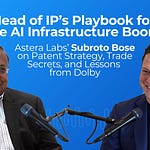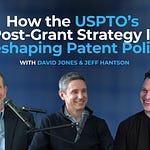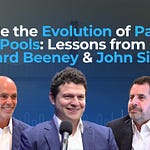Good lawyers effectively deal with the present. Very few have what it takes to create the future. Professor Ryan Abbott is doing just that.
He leads the DABUS project: the first time ever an AI machine has been named as an inventor on a patent application. Most thought that the project was an interesting academic exercise that was unlikely to go anywhere. Some - uncharitably - dismissed it as "a publicity stunt."
Yet, the DABUS project did get a patent in South Africa. And, an Australian judge ruled that AI machine can be recognized as an inventor. Even more significantly, the DABUS project successfully raised awareness about the issue of AI inventorship among policy makers all over the world.
But what does it mean for an AI system to be named as an inventor in the real world?
In this episode, Abbott makes his case for the skeptics: Identifying AI as the inventor on patents is morally and commercially important. He also explains how to judge whether the human pushing the buttons is as much an inventor as the AI they’re programming.
On this episode, Eli and Prof. Abbott talk about the Artificial Inventor Project, whether everything will be “obvious” in the future, and Prof. Abbott’s fascinating new book “The Reasonable Robot: Artificial Intelligence and the Law.”
Episode Highlights:
[1:41] Meet our guest: Abbott explains how degrees in law and medicine pushed him towards patents. He worked for the World Health Organization (WHO) on patents related to life sciences.
[6:17] The eureka moment: Around 2013, Abbott noticed that life sciences companies were using AI to scan through large databases for information, which prompted research and inventions. Normally, people who did that would be named on the resulting patents.
[8:32] The case for AI inventors: Based on his observations, Abbott outlines his academic argument for naming AI on patents: It incentivizes humans to build machines that come up with inventions, which is exactly the purpose of the patent system.
[11:39] Meet DABUS: Abbott discusses how he teamed up with Dr. Stephen Thaler, who invented a type of AI called DABUS and is a pioneer of naming AI on patents. DABUS is the AI identified in patents Abbott is defending in courts around the world as a leader of the Artificial Inventor Project.
[12:13] Breaking the mold: The Artificial Inventor Project is breaking new ground with its attempts to name AI as inventors. AI has only just become capable of contributing to inventions — and patent lawyers still advise their clients to name themselves, not their machines.
[13:23] Copying copyright: Copyright law is ahead of patent law when it comes to AI involvement. It’s possible to guess how AI will work in patents by looking at the technology’s role in copyright cases.
[18:00] Break law, don’t make law: Abbott explains why he chose to litigate on behalf of AI inventors, rather than lobby, and why he picked the specific cases he did.
[23:51] The human touch: Humans are still involved in AI inventions — so aren’t they really the inventors? Abbott addresses the tricky topic of weighing human versus AI involvement.
[28:01] Assessing merit: Abbott explains why it can be helpful to compare AI involvement to a team of people working on a new invention in a lab. What role does someone have to play to earn credit?
[30:12] Why AI inventorship matters: Despite the difficulties, naming AI inventors is worth it. Abbott makes the case that there is a moral responsibility to accurately identify who — or what — invented something. Not to mention the impact on entitlement to the IP.
[37:36] What’s next for the Artificial Inventor Project: Abbott and Thaler's work raises broader discussions about tech and the law, and how that relationship should work.
[46:25] Are these lawsuits artificial?: Abbott responds to accusations that his project is a publicity stunt.
[48:12] A problem prediction: Abbott admits that he has concerns about how hindsight bias could affect AI inventor claims, with regards to obviousness analysis.
[49:38] Mixed messages: How differences in the way we treat driverless cars versus Uber drivers reveal our double standards about AI — and how this limits the way we use it.
[52:43] A note for the next legal generation: Abbott’s advice for future lawyers: Study up on tech as well as technicalities. Your clients will thank you.










